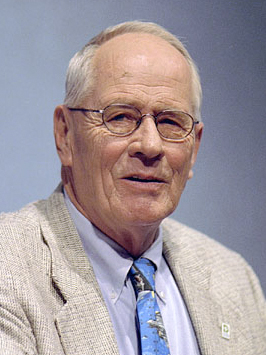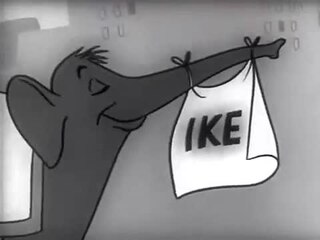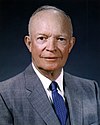
Dwight David "Ike" Eisenhower was an American military officer and statesman who served as the 34th president of the United States from 1953 to 1961. During World War II, he served as Supreme Commander of the Allied Expeditionary Force in Europe and achieved the five-star rank of General of the Army. He planned and supervised the invasion of North Africa in Operation Torch in 1942–1943 as well as the invasion of Normandy (D-Day) from the Western Front in 1944–1945.

The 1956 United States presidential election was the 43rd quadrennial presidential election. It was held on Tuesday, November 6, 1956. President Dwight D. Eisenhower successfully ran for reelection against Adlai Stevenson II, the former Illinois governor whom he had defeated four years earlier. This election saw the sixth and most recent rematch in presidential history, and the second where the winner was the same both times. This was the last election before the term limits were established by the 22nd Amendment.

Stephen Edward Ambrose was an American historian, most noted for his biographies of U.S. Presidents Dwight D. Eisenhower and Richard Nixon. He was a longtime professor of history at the University of New Orleans and the author of many bestselling volumes of American popular history.

Supreme Headquarters Allied Expeditionary Force was the headquarters of the Commander of Allied forces in northwest Europe, from late 1943 until the end of World War II. US General Dwight D. Eisenhower was the commander in SHAEF throughout its existence. The position itself shares a common lineage with Supreme Allied Commander Europe and Atlantic, but they are different titles.

Robert Bernard Anderson was an American administrator, politician, and businessman. He served as the Secretary of the Navy between February 1953 and March 1954. He also served as the Secretary of the Treasury from 1957 until 1961, and was one of President Dwight Eisenhower's closest confidants.

Kathleen Helen Summersby, known as Kay Summersby, was a member of the British Mechanised Transport Corps during World War II, who served as a chauffeur and later as personal secretary to Dwight D. Eisenhower during his period as Supreme Commander Allied Expeditionary Force in command of the Allied forces in north west Europe.

The 1952 Republican National Convention was held at the International Amphitheatre in Chicago, Illinois from July 7 to 11, 1952, and nominated the popular general and war hero Dwight D. Eisenhower of New York, nicknamed "Ike," for president and the anti-communist crusading Senator from California, Richard M. Nixon, for vice president.

The Draft Eisenhower movement was a widespread political movement that eventually persuaded Dwight D. Eisenhower, former Chief of Staff of the United States Army, to contest the presidency of the United States.

Dwight D. Eisenhower's tenure as the 34th president of the United States began with his first inauguration on January 20, 1953, and ended on January 20, 1961. Eisenhower, a Republican from Kansas, took office following a landslide victory over Democrat Adlai Stevenson in the 1952 presidential election. John F. Kennedy succeeded him after winning the 1960 presidential election.
This bibliography of Richard Nixon includes publications by Richard Nixon, the 37th president of the United States, and books and scholarly articles about him and his policies.
Robert Hugh Ferrell was an American historian and a prolific author or editor of more than 60 books on a wide range of topics, including the U.S. presidency, World War I, and U.S. foreign policy and diplomacy. One of the country's leading historians, Ferrell was widely considered the preeminent authority on the administration of Harry S. Truman, and also wrote books about half a dozen other 20th-century presidents. He was thought by many in the field to be the "dean of American diplomatic historians", a title he disavowed.

This bibliography of Harry S. Truman is a selective list of scholarly works about Harry S. Truman, the thirty-third president of the United States (1945–1953). See also the bibliographies at Harry S. Truman, Presidency of Harry S. Truman, and Foreign policy of the Harry S. Truman administration.
Charles Craig Cannon was a United States Army officer who served as Aide-de-camp to General Dwight D. Eisenhower following the conclusion of World War II.
Ann Cook Whitman was an American secretary and government official who served as chief of staff to the vice president from 1974 to 1977.
William Beatty Pickett is an American historian and professor emeritus at Rose-Hulman Institute of Technology in Terre Haute, Indiana. He is known as an authority on President Dwight D. Eisenhower and Indiana Sen. Homer E. Capehart, and is the author of several well-regarded books on U.S. history including Dwight David Eisenhower and American Power and Eisenhower Decides To Run: Presidential Politics and Cold War Strategy.

Dwight David Eisenhower and American Power is a 1995 biography of the U.S. president and military leader by historian William B. Pickett, a professor at Rose-Hulman Institute of Technology in Terre Haute, Indiana. It was published as part of Harlan Davidson's American Biographical History Series.

Off the Record: The Private Papers of Harry S. Truman is a 1980 book edited by historian Robert Hugh Ferrell which collects writings and correspondence by Truman, the 33rd U.S. president, between 1945 and 1971. Historian Donald R. McCoy, writing in Presidential Studies Quarterly, called it a work of "great scholarly value … which is easily one of the most important and interesting books dealing with the recent Presidency published during the past decade."

Ill-Advised: Presidential Health and Public Trust is a 1992 book by historian Robert Hugh Ferrell examining politically motivated cover-ups of serious medical issues afflicting U.S. presidents while they were in office. Although Dwight Eisenhower is the main focus of the book, it covers the presidency for a century, from Grover Cleveland's mouth cancer in 1893 to the health of George H. W. Bush, then-current president when the book was first published. All of these instances, Ferrell argues, raised serious questions about the fitness of each president to hold office, as well as whether the presidents and their physicians violated the public trust in keeping the incidents secret.
The United States foreign policy of the Dwight D. Eisenhower administration, from 1953 to 1961, focused on the Cold War with the Soviet Union and its satellites. The United States built up a stockpile of nuclear weapons and nuclear delivery systems to deter military threats and save money while cutting back on expensive Army combat units. A major uprising broke out in Hungary in 1956; the Eisenhower administration did not become directly involved, but condemned the military invasion by the Soviet Union. Eisenhower sought to reach a nuclear test ban treaty with the Soviet Union, but following the 1960 U-2 incident the Kremlin canceled a scheduled summit in Paris.

"Ike for President", sometimes referred to as "We'll Take Ike" or "I Like Ike", was a political television advertisement for Dwight D. Eisenhower's 1952 campaign for the presidency of the United States.














